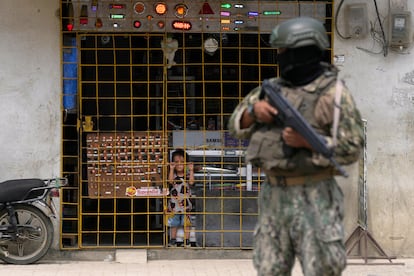A childhood amid bullets: Homicide rate of minors soars in Ecuador
Two children were murdered every day in 2023 in Ecuador, which is suffering a wave of violence due to drug trafficking: ‘The state, society, and family, we have all failed them,’ says an expert

Whenever gunfire is heard in almost any neighborhood in Guayaquil, the first instinct is to run to get the children to safety. Hide in the room farthest from the front door, away from the windows, under the bed, or throw the mattress over them. There is no sufficient shield to protect them. It is not enough to forbid them from going to school after each outbreak of violence, because they are murdered while they are sleeping, at home, with the windows and doors closed, like Valentina, Bryanna, Adiel, Aitana, Maité, Alexander... In the arms of their parents, or eating an ice cream. Violence in Ecuador severely affects children; at least two minors were killed every day in 2023, according to the Ministry of the Interior.
Last year ended with a staggering figure of 770 homicides of children aged from birth to 19, as classified by the Ecuadorian police. That represents a 640% increase compared to the 104 recorded in 2019, UNICEF has alerted. Most of the homicides were as a result of firearms and the victims fell mainly into two groups: newborn babies and children aged up to four; and adolescents aged between 15 and 19, who are recruited by criminal gangs that use minors at the forefront of the war to extort, murder, sell drugs and recruit other children, the police have reported.
“When we see this terrifying figure of 770 homicides, we realize that for the last four years, children have assumed the bodily risks of violence,” says Sybel Martinez of the Alliance for the Rights of Children and Adolescents. “And that raises the question, because the protection of children is exclusively the responsibility of adults. We are talking about the state, society, and family, and we have all failed them.”
“This is happening as an evolution of the increase of criminality in Ecuador, and it is worrying in a country where childhood already presented, and presents, multiple challenges,” says Luz Ángela Melo, UNICEF representative in Ecuador. Keeping children alive is not the only challenge for the state, which has extended care for 4.5 million infants. Ecuador has the third-highest rate of chronic malnutrition in the region, which means that one out of every five children under two years of age is not well-nourished and does not reach healthy levels of height or weight, which leads to diseases that prevent their development.
In Ecuador, 37% of children aged under five consume water contaminated with E. coli bacteria, and that figure increases if the children are in the Amazon region. Added to this, half of the country’s children are physically and psychologically abused, according to the 2018 Health and Nutrition survey, and there is no permanent campaign in place to prevent it. “Ecuadorian society must stop normalizing violence against children and women; it is an outcry,” says Melo.
Every day, six girls who have been victims of sexual abuse aged between 10 and 14 give birth. “Not only are they scarred by the trauma of sexual violence, but they are girls who instead of playing or studying are breastfeeding,” Melo stresses. Today, 244,000 children and adolescents are outside the education system in Ecuador.
The Alliance for the Rights of Children and Adolescents and other human rights organizations are closely observing the effects of the declaration of an “internal armed conflict” by President Daniel Noboa on January 9, after a wave of attacks that included the seizure of a television channel by armed men. The operations of the security forces have resulted in almost 4,000 arrests since then, among them minors, “who when they were apprehended, we could see that in addition to being humiliated and tortured, nobody thought to say ‘hold on a minute, they are children,’” says Martinez. “We are not saying that they are not offenders; we are saying that besides being offenders they are victims of recruitment, trafficking, and of a society and a state that effectively looks at what is happening from a distance and without [thinking of] the need to protect them. And that the response we give is that they must be tried as adults.”
Sign up for our weekly newsletter to get more English-language news coverage from EL PAÍS USA Edition
Tu suscripción se está usando en otro dispositivo
¿Quieres añadir otro usuario a tu suscripción?
Si continúas leyendo en este dispositivo, no se podrá leer en el otro.
FlechaTu suscripción se está usando en otro dispositivo y solo puedes acceder a EL PAÍS desde un dispositivo a la vez.
Si quieres compartir tu cuenta, cambia tu suscripción a la modalidad Premium, así podrás añadir otro usuario. Cada uno accederá con su propia cuenta de email, lo que os permitirá personalizar vuestra experiencia en EL PAÍS.
¿Tienes una suscripción de empresa? Accede aquí para contratar más cuentas.
En el caso de no saber quién está usando tu cuenta, te recomendamos cambiar tu contraseña aquí.
Si decides continuar compartiendo tu cuenta, este mensaje se mostrará en tu dispositivo y en el de la otra persona que está usando tu cuenta de forma indefinida, afectando a tu experiencia de lectura. Puedes consultar aquí los términos y condiciones de la suscripción digital.








































